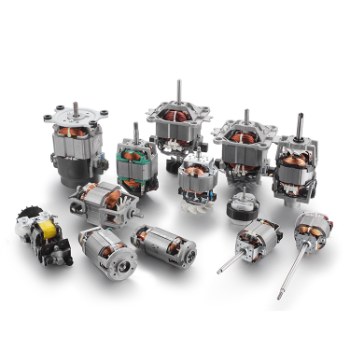
As global temperatures rise and summer heat waves become more frequent, fans and air conditioners have become indispensable cooling tools. However, in the two major markets of Europe and the United States, the usage habits are very different – not only due to climatic factors, but also to the important role of motor technology in the global demand for cooling.
In the United States, air conditioning is almost standard in homes. Data shows that more than 88% of U.S. homes are equipped with air conditioning equipment, and the usage rate in high-temperature areas such as the south is close to 100%. These devices rely heavily on high-efficiency motors to drive compressors, fan impellers, and condensing systems, and the performance of the motors directly determines the cooling effect and power consumption efficiency.
In Europe, air conditioning coverage is only 10-20%, and in countries such as Germany and the United Kingdom, it is even less than 5%. There are several key reasons behind this:
The summer climate is mild, the dependence on active cooling is low, and the European region is in the Mediterranean climate and temperate oceanic climate, and is significantly affected by the North Atlantic warm current and westerly wind belt, and is in the middle and high latitudes of the north latitude, generally at 20-28 °C
There are many old buildings, and it is difficult to install a central air-conditioning system. Most European buildings have thick walls and high ceilings, with strong air convection and smooth natural ventilation. And most importantly, many European communities have strict restrictions on the appearance of buildings, and they cannot install plug-ins at will.
Energy prices are high, and consumers are more concerned about energy conservation and environmental protection. Electricity prices in Europe are much higher than in North America and Central Asia, and Europeans are generally environmentally conscious and prefer to use fans with low energy consumption.
Passive cooling methods such as fans and natural ventilation are preferred. Good at passive cooling with good thermal insulation design, shading shutters, stone floors, ventilated roofs, etc.
However, with the trend of global warming, Europe has repeatedly set high temperature records in recent years, often reaching 40°C, and the demand for air conditioners and fans is rising rapidly

So what are the high-efficiency "cooling methods" available to European residents while maintaining low energy consumption and low cost without considering the installation of air conditioning?
1. Installing solar panels on the roof: The most outstanding benefit of solar panels is to save electricity demand, which can cover 80% of the electricity consumption of the family, save an average of 3,000 yuan in electricity bills per year, absorb more than 80% of the light and heat, reduce direct sunlight on the roof, and convert about 21% of solar energy into electrical energy, directly reducing the accumulation of heat energy.
2. Smart curtains, parasols, blinds, etc. to assist in cooling: traditional curtains cannot play a good role in sun protection due to the light and thin curtain fabric. But the weight of thick curtains is not acceptable to traditional tie rods. At this time, the importance of smart curtains is reflected, and the curtain fabric that can withstand the weight of 30KG has a good sunscreen effect. When opening the curtains, open the blinds to allow air to flow smoothly throughout the room
3. Strengthen air convection and enhance air circulation. Install circulating fans, exhaust fans and other facilities to ensure that the air and temperature in the house flow smoothly
4. Use silent energy-saving fans and condensate fans. Bladeless fans, floor fans, ceiling fans, and desktop fans can enhance the cooling effect by 2-3 times in the room environment with air convection. The condensate fan is closer to the air conditioner, converting the water into ice, blowing away the cold air, which can achieve instant "coolness".
The "core power" behind coolness: the motor
Whether it's a lightweight desktop fan or a bulky air conditioning system, the motor is always the core driving unit. From blade rotation to wind speed adjustment, from intelligent swing head to noise control, the quality and efficiency of the motor determine the product performance.
BG Motor offers a wide range of motor solutions for summer cooling applications:
High-speedAC motor: suitable for floor fans, tower fans, and air conditioning fans
High-speed small shaded pole fans: suitable for desktop fans, handheld fans, ceiling fans, etc
Tubular motor: large torque, large bearing weight, able to bear heavy cord without damage
Permanent magnet DC motor: large torque, wide speed range, can be used to assist in the installation of solar panels, and has been successful and perfect before.
Vacuum cleaner motor: A variety of styles of vacuum cleaners, with both DC power supply and AC power supply options, suitable for ventilation and smoke exhaust systems, to enhance the air circulation in the house
Let BG Motor be your partner for global summer cooling
BG Motor respects the lifestyle and behavior habits of any region, and deeply understands the differentiated needs of European and American customers. Whether it's the American market, where high-performance air conditioning motors are required, or the European market, where elegant, energy-efficient fans are preferred, we offer highly matched customized motor solutions.
Cool summer, start with a good motor. BG Motor is with you to protect the comfortable life in summer.
For more information about customized motor solutions, please contact:
E-mail:technology@china-bgmotor.com
Website:www.china-bgmotor.com
 BACK
BACK
Yesterday, the 138th China Import and Export Fair (Canton Fair) was grandly open…
In the golden autumn of October, the fruits are fragrant. On this beautiful mome…
Dear friends, the 138th Canton Fair will be held in Pazhou, Guangzhou on October…
At BG Motor, we firmly believe that the strength of a team can carry dreams furt…
New Breakthrough at Conifer (Silicon Valley Startup)What’s new?Conifer has devel…
The 2025 World Robot Conference (WRC), held in Beijing, brought together top min…